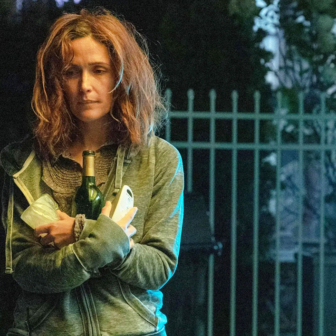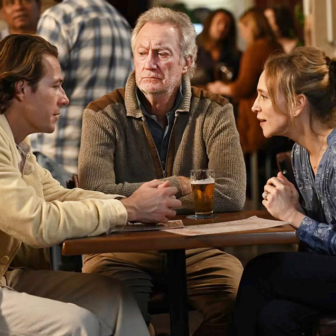By chance I went into lockdown on 24 February, a few weeks ahead of the rest of Australia, for surgery and a long rehabilitation. While I was learning to walk again, the world changed dramatically. Cinemas, already struggling with the streaming boom, closed their doors, and some will stay that way.
In Sydney, a city not blessed with a cinematheque like Melbourne’s ACMI, Adelaide’s Mercury or the screens at Brisbane’s Gallery of Modern Art, the Event multiplex cinema on lower George Street is gone, to be replaced by a high-rise apartment and retail development. Although the approvals for the project envisaged a number of cinema screens, rather fewer seem to be on the cards now that Gladys Berejiklian is rushing to get construction activity moving again. However many screens it has, it won’t be operating anytime soon.
The Palace cinema empire, heavily invested in new cinemas in Sydney, was among the first to close its doors. Its business model relies heavily on festivals of national cinema, which puts it in competition with city-based film festivals. With streaming already threatening its profits, the cancellation of the Alliance Française French Film Festival hit its biggest revenue-earner.
Hoyts, which has its own multiplex way up the other end of Broadway, is owned these days by China’s Wanda Group, whose parent company has been acquiring cinemas and related real estate worldwide. Village Roadshow is also part of a global empire: owned by the publicly listed Kirby family company, it diversified into theme parks and film studios in the eighties and nineties to fend off the home video revolution, and retains a distribution deal with Warner Brothers.
So the future of some important Australian cinemas is in the hands of real estate agents and developers. At least the pandemic may have settled the argument about how to premiere movies: we’ll be seeing many more of them online in our lounge rooms, rather than together in the dark.
Off the commercial circuit, film festivals, Sydney and Melbourne included, have gone online for now, in various limited editions. Internationally, Cannes held out and then, sadly, aborted its 2020 program entirely. We will see what happens come September, when first Venice and then Toronto are due. Dendy’s decision to close its Circular Quay cinemas in late February will make life complicated for the Sydney Film Festival when it resumes next year.
With all this happening, I was lucky to escape hospital for a few hours at the cinema before the complete lockdown began, and luckier still that the nearest cinema was the Randwick Ritz, one of just two art deco picture palaces still operating in Sydney. The Ritz is owned these days by Eddie Tamir, a cinephile whose Melbourne cinemas — the Classic, the Lido and the Cameo — mix repertory, art-house and festival screenings.
The film I went to see there was apt indeed — an urban thriller about cities, corruption and planning. Motherless Brooklyn it’s called, and it’s a twenty-year passion project for actor Edward Norton, who wrote, directed and stars in it. Alec Baldwin features as a thinly disguised Robert Moses, the New York planning tsar who invented urban planning commissions, those bodies of unelected officials who determine the shape of cities and the fate of neighbourhoods.
I’ll return to Motherless Brooklyn below, but first to Hearts and Bones, one of the essential Australian films of this year, and one of the first local films to premiere online during the pandemic. In cinemas from 1 July, it stars Hugo Weaving, with newcomers Andrew Luri, Bolude Watson and Hayley McElhinney.
For me, Weaving is still one of the best male actors we have, a man who commands the stage and brings insight and sensitivity in the cinema. He also has a lovely range, taking in the gravity of Elrond in the Lord of the Rings trilogy, his delirious turn as Tick Belrose/Mitzi Del Bra in The Adventures of Priscilla, Queen of the Desert, his heroin-addicted gay footballer Lionel Dawson in Little Fish, and Johnno, the hardened yet ambiguous senior detective in the first, 2013, iteration of Mystery Road.
In the latter film he held the drama in his hand: it was his laconic turn that gave Aaron Pedersen’s Jay Swan a tension against which to pit himself. The scene between the pair in the country cafe, each fencing, probing and holding back, elevated the film to the level of classic western. It made the final shootout spellbinding: until the last we did not know which way Johnno would jump. It was all the more compelling because it echoed the taciturn, secretive authority of cops who wield secret power.
Weaving is a generous actor: others grow in stature working with him. In the barren decades from the mid nineties till recently, few screenwriters wrote portraits of Australian men that transcended the larrikin. Weaving was the actor who could bring something more to those roles. At sixty, he is consummate: the young pretender, Ewen Leslie, will have a long wait to dislodge him.
Hearts and Bones is a film about judgement. And about trauma. The judgements we make of others: their pasts, their actions, their reputations; the judgements we make across the distance of a comfortable life. One of the grand achievements of this film is to present the way refugees see other Australians.
Weaving plays a photographer, Dan Fisher, who travels to wars and calamities capturing images of human suffering to prod consciences back home. A human rights organisation is proposing an exhibition of his work, but Fisher is reluctant to do interviews. “It’s your life’s work,” protests his partner. “It hasn’t made a difference, has it?” he responds.
Fisher has paid a price for documenting scenes of horror. He is withdrawn; he has memory lapses, night terrors, flashbacks, dizzy spells — classic post-traumatic distress. He persists because he is driven.
Sebastian (Andrew Luri), originally from Sudan, hears Dan on the radio and seeks him out. Sebastian works two jobs: heaving laundry and driving a cab. His partner Anishka, with whom he has a daughter, also works long hours and complains she never sees him. Sebastian’s other solace is a men’s choir made up refugees from right across the African subcontinent. He thinks the choir will help Dan. He wants Dan to photograph the choir.
But he has another motive. He recognised his former village in one of Dan’s best-known photographs. He doesn’t want it exhibited; he doesn’t want to be reminded of the past. He has never talked to Anishka about it.
Hearts and Bones is a first feature from Ben Lawrence, who has previously made a short fictional film and long-form documentaries. It is strong drama, set in a wintry Melbourne, and much of the time avoids cliché.
This is essentially a four-hander, and the women in this film — Bolude Watson as Anishka and Hayley McElhinney as Dan’s partner Josie — are as critical to the drama as the men. Trauma and loss hang in the silences and avoidances of both couples. There are many forms of loss, and the film challenges the instant wisdom available to the middle class: the talking cure. Some experiences may be out of reach of counselling, when all that is left, all that is possible, is work, music and art.
One of the film’s most powerful scenes comes after Josie, righteous in her assumptions, contacts Anishka to talk about Sebastian’s past. Each is pregnant, each has loss to confront. But it is Josie who has presumed to judge.
In resolving this drama, Hearts and Bones walks very close to a dramatic edge. Rare among films, moral judgements are at its heart, and Lawrence unfolds these with such emotional intelligence that I can forgive the resolution’s straining to pluck every emotional sinew. What will stay with me is the memory of two women confronting each other across a kitchen table.
In Motherless Brooklyn, Edward Norton has a lot he wants to tell us. One thing he wants us to know is that people with Tourette syndrome struggle constantly with an ungovernable tongue, or rather a set of linguistic neurocircuits that can jam and leave them blurting. Behind these tics are often very shrewd minds whose calculations don’t always translate immediately to speech.
Norton plays Lionel Essrog, a private investigator who is one of a small group of ex–orphan boys who dig around, not always legally, in the Brooklyn of the late 1950s. Norton’s Lionel is a triumph of acting — and directing.
Communication may sometimes be a struggle, but agency boss Frank Minna (Bruce Willis, also fabulous) values Lionel’s smarts. Frank is another orphan boy and has Lionel watching his back. So when he is killed, Lionel wants to know who ordered the hit. The rest of the group is directionless; it’s Lionel who persists while the others scramble for bread-and-butter jobs around the neighbourhood.
Lionel is the terrific creation of Jonathan Lethem in his 1999 noir, also Motherless Brooklyn, on which this film is based. Norton optioned the book soon after it appeared.
But Norton wants to tell us more. Because he wants us to know how large-scale corruption works in city planning, he has moved the story back to 1957, when postwar reconstruction brought a building boom to New York’s boroughs. Bestriding the period was Robert Moses, lauded as the planner who shaped New York over four decades. Moses not only had a huge vision and a labyrinth of connections; he also had very good spin doctors. Politicians ate from his hand. He built miles of freeways, and was celebrated as endowing New York with its parks. He wielded enormous power through his innocuously named planning commissions, some of which had their own police forces and levied their own taxes.
Moses’s reputation took a massive hit in 1974 with the publication of Robert Moses: The Power Broker by Robert Caro, the journalist turned political biographer. Caro’s forensic exhumation showed how the planning commissions became autocracies. It was published at a time when resident and community action groups had begun to resist the demolition of whole neighbourhoods. It showed how Moses’s commissions privileged the car over public transport, and how systemic racism perpetuated segregation and ensured the Long Island enclaves of the rich weren’t disturbed by the buses that carried the poor.
Caro’s book took seven years to write and won him a National Book Critics Circle Award. Among other people, it inspired a young Barack Obama — and Edward Norton, who still wants people to understand how power shapes our cities.
It’s a lot to put in a movie. Or even sketch in. Alec Baldwin’s Moses Randolph sits on top of a huge pyramid of power: when he finally appears on the screen he is the architect as imagined by Ayn Rand. More interesting is Moses’s fictional brother, Paul (Willem Dafoe), an engineer with an obsession Moses is able to manipulate.
Dramatically, the weak thread is Lionel’s relationship with Laura Rose (Gugu Mbatha-Raw), a young intern helping seasoned campaigner Gabby Horowitz (Cherry Jones) in her fight against projects that will displace the poor. The relationship has too much weight to carry, and when the otherwise skilful Norton directs himself in a love scene the chemistry just isn’t there. Just a few minutes earlier, he handles a scene in a Harlem jazz club magnificently. The music for once speaks for him.
After twenty years of development hell, Norton decided that the rise of another deal-driven autocracy meant the film needed to be made, and needed to tell us many things. The dialogue badly needed thinning, to let the emotional tide rise and swell and crash unencumbered. But for all that, it’s a film worth seeking out, because it requires us to think. And if it persuades even a few of us to read Caro’s investigation of the rise of the powerful, unelected planner, then so much the better. •




